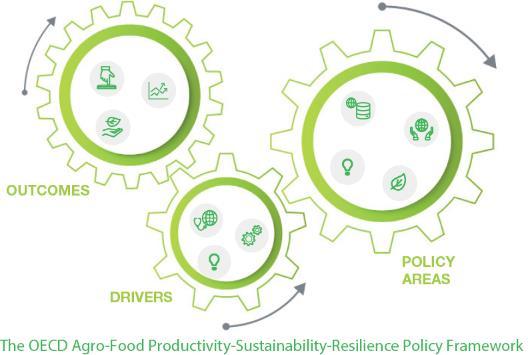
2 minute read
POLICIES FOR AGRICULTURAL INNOVATION
Look for Renewables 2021 on December 1st, 2021. Renewables 2021 is the IEA’s primary analysis on the sector, based on current policies and market developments. It forecasts the deployment of renewable energy technologies in electricity, transport and heat to 2026 while also exploring key challenges to the industry and identifying barriers to faster growth. Recent publications: IEA (2021), World Energy Outlook 2021 https://www.iea.org/reports/world-energy-outlook-2021 IEA (2021), Tracking Clean Energy Progress https://www.iea.org/topics/tracking-clean-energy-progress IEA (2021), India Bioenergy Workshop https://www.iea.org/events/india-bioenergy-workshop-currentstatus-in-india-and-international-experience-in-deploying-biogas-and-msw-to-energy Contact: Jeremy Moorhouse (IEA/EMS/RED)
POLICIES FOR AGRICULTURAL INNOVATION
The OECD Agro-food Productivity Sustainability Resilience policy framework Innovation in agriculture is a key driver to improve the productivity and environmental sustainability of the sector. Innovative technologies and practices allow the food systems to produce more food for a growing world population, using less resources and reducing the pressures on the environment. Furthermore, innovation can make food systems more resilient to systemic shocks exacerbated by climate change, including sudden outbreaks like COVID-19 pandemic. The Agro-food Productivity-SustainabilityResilience policy framework responds to a demand from the G20 in 2012 and is currently a ready-to-use instrument to analyse the performance of agricultural policies from a holistic perspective and their contribution to enhance innovative outcomes. Agriculture Innovation Systems Recognizing the potential role of biotechnologies in increasing productivity and facilitating adaptation to climate change, the OECD Trade and Agriculture Directorate (TAD) has analysed agricultural innovation systems and the role of policies in fostering innovation. In 2013, an OECD report on the role of the government in fostering innovation in the agri-food sector already defined the basis to analyse a wide range of policies that affect agricultural innovation systems. Applied first to three pilot country reviews published in 2015 (Australia, Brazil and Canada), the framework was used in a number of country reviews: the Netherlands (2015), Turkey and the United States (2016), P.R. China, Estonia, Korea and Sweden (2018), and Japan and Latvia (2019). The review of Viet Nam is expected to be completed in 2021. Furthermore, the country studies of Argentina (2019) and Norway (2021) have also a focus on agriculture innovation applying the revised framework. The main findings and policy recommendations from the country reviews achieved since 2015 were published in 2019 (OECD, 2019). A booklet containing an overview of the main findings and a policy brief were made available at an OECD seminar organised on 11 May 2019 before the G20 Meeting of Agricultural Ministers in Niigata, Japan.

21







